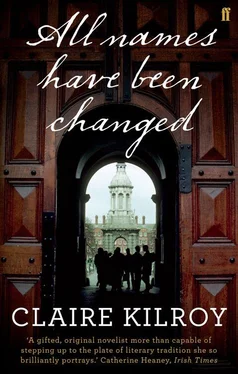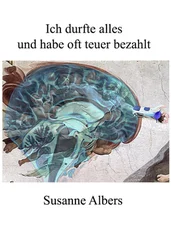Claire Kilroy - All Names Have Been Changed
Здесь есть возможность читать онлайн «Claire Kilroy - All Names Have Been Changed» весь текст электронной книги совершенно бесплатно (целиком полную версию без сокращений). В некоторых случаях можно слушать аудио, скачать через торрент в формате fb2 и присутствует краткое содержание. Год выпуска: 2010, Издательство: Faber & Faber, Жанр: Современная проза, на английском языке. Описание произведения, (предисловие) а так же отзывы посетителей доступны на портале библиотеки ЛибКат.
- Название:All Names Have Been Changed
- Автор:
- Издательство:Faber & Faber
- Жанр:
- Год:2010
- ISBN:нет данных
- Рейтинг книги:5 / 5. Голосов: 1
-
Избранное:Добавить в избранное
- Отзывы:
-
Ваша оценка:
- 100
- 1
- 2
- 3
- 4
- 5
All Names Have Been Changed: краткое содержание, описание и аннотация
Предлагаем к чтению аннотацию, описание, краткое содержание или предисловие (зависит от того, что написал сам автор книги «All Names Have Been Changed»). Если вы не нашли необходимую информацию о книге — напишите в комментариях, мы постараемся отыскать её.
All Names Have Been Changed — читать онлайн бесплатно полную книгу (весь текст) целиком
Ниже представлен текст книги, разбитый по страницам. Система сохранения места последней прочитанной страницы, позволяет с удобством читать онлайн бесплатно книгу «All Names Have Been Changed», без необходимости каждый раз заново искать на чём Вы остановились. Поставьте закладку, и сможете в любой момент перейти на страницу, на которой закончили чтение.
Интервал:
Закладка:
I pulled open a drawer in his desk. Ink jars, rulers, sellotape, a stapler. I rammed it shut and grabbed the next handle down. Letters sprang out of that drawer like a jack in the box, it was packed so tightly. I gathered those that had fallen. Bond paper, pale blue, the stationery used by old ladies and priests. A few words were written in copperplate in the dead centre of each page, the lettering so tiny I had to hold it to my nose. You will pay, read one. Mark my words, read another. There is always a price. At the base of each note, the time and date was scratched in a different hand. Glynn’s.
‘Look,’ I said to Aisling, ‘the poison-pen letters,’ but Aisling wasn’t listening.
‘It’s the demons,’ she said, still bent over the pages of Glynn’s red notebook. Her black hair had fallen forward, concealing her features. She was invisible in the darkness in her funereal clothes. It was like looking into a vault. Not until she raised her white face to me, which was contorted with distress, did I see where the voice was coming from. ‘It’s weird fucking drawings of the demons, Declan,’ she practically whimpered. ‘The ones you were talking about.’
‘ Me ?’
‘Out there on the corridor. Belsabub and Sattan, you said. Diabolus I and II. He’s drawn pictures of them. Look.’ She held up the pages of the red notebook to me, but what could I see in the dark?
‘Come on,’ I told her, ‘we’d better go before we lose him.’ I couldn’t think of anything else to say. It was the best that I could come up with. We shoved everything back where we’d found it and got the hell out of there. Glynn’s door locked shut behind us. Aisling clapped a hand to her mouth.
‘The cigarette,’ she said. We’d left it smouldering. The two of us stared at each other in mute concern, then Aisling started to laugh — this mad, hysterical, unhinged laugh, to which there was no reasonable response.
18 An puc ar buile. The goat is mad
Coronas of mist encircled the Victorian lanterns as we raced across the black sweep of Front Square, the cobbles slippery and glistening in the drizzle, Aisling a shadow flitting by my side. We caught up with the others just before they disappeared under the Arch. They hadn’t noticed our absence, so preoccupied were they with Glynn and his raucous tumult, squalling above his head like a flock of gulls. His funny walk was back.
Glynn blundered out onto College Green and headed up Westmoreland Street. We trudged along after him, docile as a herd of livestock. We’re lumbered with him now, for better or for worse, I remember thinking. It was too late to abandon him. He led us to the nearest pub. If he was surprised, upon turning around, to find the five of us lined up behind him, he betrayed no sign of it. But then, he was hardly capable of discharging a look of surprise, the whiskey-sodden state of him.
Glynn’s work, in keeping with the great tradition of Irish fiction, is littered throughout with scenes fuelled by alcohol, of which his male protagonists partake liberally, enabling Glynn to introduce new characters through old ones: his men turn into different people with a few jars on them, sometimes aggressive, sometimes maudlin, effectively doubling his cast. What a frugal individual he was. Nothing went to waste.
Alcohol was a narrative device he leaned on heavily, employing it to fulfil the function more traditionally executed by the conceit of the dream. Inebriation freed Glynn’s novels to roam in whichever direction he wished, unconstrained by logic or the limiting principles of plot development. It liberated Glynn’s work so much in fact that at times it seemed he was working within the fantasy genre. He wrote about chaos as if it were a real place, like Nighttown in Joyce’s Ulysses. Which is why, I suppose, when Glynn took a drink, it was a literary event. He located an empty table and sat at the head of it. We filed in on either side of him.
I tried to catch Guinevere’s eye. She hadn’t acknowledged me since I’d left her cottage that morning. Glynn must have noticed this one-way exchange, so plastered that he had acquired a bird’s-eye perspective on matters that didn’t concern him. I think he wanted to be young again. That’s what I suspect. He raised his glasses to his shiny forehead, observing the two of us with his artist’s eye, before leaning over to speak into my ear in the same low rumbling growl that had gone on all afternoon in his office.
‘You ever seen footage of human gestation, Declan?’ he wanted to know. I shook my head. ‘The little wriggling sperm trying to penetrate the big white ovum?’ He sat back to try to get my face into focus. Couldn’t. Didn’t matter. He leaned in again. ‘Because that’s what you’re like, Declan. You’re like that little sperm, banging your head over and over against their battlements, whining for admittance.’ He scratched his head, then examined his fingernails to see what he’d dislodged.
‘That’s lovely,’ I said. ‘That’s just lovely. That’s a really lovely image you have of me there, Professor Glynn.’
‘No, no, no, no,’ said Glynn, nudging my arm with the rim of his pint, leaving a strip of foam on it. He was more the Dogman than himself at that moment, the way he smirked lopsidedly into his stout before sinking his teeth in it. He was enjoying himself, enjoying his troublemaking. ‘Not you personally, you fecking eejit, Declan. This is a paradigm that applies to all male-female relationships. You — meaning: us, banging our heads off the walls; and them — meaning: the women, imperturbable, impassive, oblivious.’ He gestured at the group. ‘Look at them,’ he remarked caustically, as if the four girls proved his point for him.
He was yellower than usual. Were we aware at the time of just how yellow he was? To a degree, perhaps, in the back of our minds. He had never exactly radiated rude health. It was only when I came upon an old photograph taken around that period that I grasped the full extent of his discolouration. There we were, the six of us, sitting around a pub table. Not that pub, not that night. Don’t know who held the camera. Some passing drunk — picture’s crooked. How young we looked, with the exception of Glynn. Astonishing, that we missed the ogre in the corner, the memento mori, the ghoul, his arms thrown genially around us, smiling for the dickybird, on the brink of expiration. It brings a lump to my throat. Four of us are flushed as pink from booze as Glynn is drained yellow. Aisling’s skin is so powdery white that the snow-glare practically blots her features out. She is two heavily kohled eyes staring out from an all but mouthless face. It was as if the camera had recorded not our likenesses, but our auras.
Glynn swirled his pint and knocked back the dregs. ‘Latin me that, me Trinity scholar,’ he concluded. A smattering of buff matter clung to his lapel. Something glinted at the base of his leg — a thin metal strip. I pretended to tie my shoelace to get a closer look. There was a smell of polyester trouser down there.
It was a staple. I sat up again. Professor Glynn had stapled his hem. Marjorie had turfed him out. It only dawned on me then. The group had probably known all along. That’s why he was living in the dive on Bachelors Walk. Not for research purposes. Marjorie had sent him packing. That wasn’t her name, by the way. Her name was a fine one: sophisticated, elegant, proclaimed in italics on the dedication page of his eight novels — no to, no for, just the six letters of her name, a cry directly from the heart. Marjorie was the name we assigned to her. It was the name she deserved, we decided — or they decided, rather — the girls. Marjorie or Mavis or Gladys. Gladys Glynn. They didn’t like sharing him with other women.
Читать дальшеИнтервал:
Закладка:
Похожие книги на «All Names Have Been Changed»
Представляем Вашему вниманию похожие книги на «All Names Have Been Changed» списком для выбора. Мы отобрали схожую по названию и смыслу литературу в надежде предоставить читателям больше вариантов отыскать новые, интересные, ещё непрочитанные произведения.
Обсуждение, отзывы о книге «All Names Have Been Changed» и просто собственные мнения читателей. Оставьте ваши комментарии, напишите, что Вы думаете о произведении, его смысле или главных героях. Укажите что конкретно понравилось, а что нет, и почему Вы так считаете.












